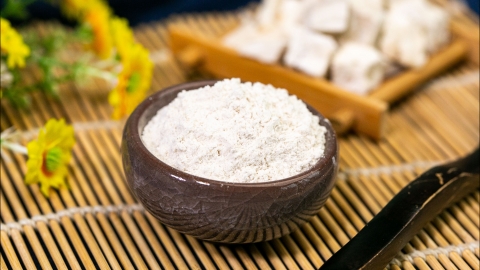What should I do if my blood sugar becomes low after drinking kudzu root starch?
Generally, low blood sugar after consuming kudzu root starch might be caused by factors such as taking kudzu root starch on an empty stomach, excessive intake of kudzu root starch, mild insulin resistance, additive effects of diabetes medications, or early-stage insulinoma. It is recommended to seek timely medical consultation to identify the underlying cause and improve the condition through dietary adjustments, medication, and other methods under a doctor's guidance. Detailed analysis is as follows:

1. Taking kudzu root starch on an empty stomach: When the stomach is empty, blood sugar levels are naturally low. Consuming kudzu root starch at this time may further lower blood sugar due to its potential blood glucose-regulating effects, which can easily lead to symptoms such as dizziness and fatigue. To prevent blood sugar fluctuations, consume a small amount of staple food such as steamed buns or porridge before taking kudzu root starch to provide baseline glucose for the body.
2. Excessive intake of kudzu root starch: Consuming too much kudzu root starch at once may overload the body's ability to regulate blood sugar, exceeding its normal regulatory capacity, which may cause hypoglycemia accompanied by symptoms such as palpitations and cold sweats. Control the amount of kudzu root starch consumed, avoid excessive intake at one time, and pay attention to any adverse reactions after consumption.
3. Mild insulin resistance: When body cells become less sensitive to insulin, insulin secretion and action may become uncoordinated. After consuming kudzu root starch, blood sugar regulation may become further imbalanced, leading to low blood sugar. Patients should follow medical advice to use medications such as metformin tablets, acarbose tablets, or gliclazide tablets to improve insulin sensitivity.
4. Additive effects of diabetes medications: During treatment with hypoglycemic drugs, the blood sugar-regulating effects of kudzu root starch may enhance the glucose-lowering effects of the medication, causing excessive blood sugar reduction and symptoms such as hand tremors and intense hunger. Patients should adjust their blood sugar management plans under medical supervision. When using medications such as insulin injection, metformin hydrochloride sustained-release tablets, or glimepiride tablets, maintain a 1–2-hour interval between medication and kudzu root starch consumption, and increase the frequency of blood glucose monitoring.
5. Early-stage insulinoma: Tumors can stimulate pancreatic β cells to secrete excessive insulin. After consuming kudzu root starch, its effects may combine with insulin's glucose-lowering action, causing a significant drop in blood sugar and frequent episodes of hypoglycemia. Treatment typically involves laparoscopic resection of the pancreatic β-cell tumor to reduce abnormal insulin secretion. Regular blood glucose monitoring is necessary after surgery to prevent recurrence of abnormal blood sugar levels.
In daily life, carry sugary snacks such as candies or biscuits at all times to promptly address hypoglycemic symptoms by replenishing glucose. Maintain regular meal patterns, avoid extreme dieting, and ensure balanced intake of carbohydrates, proteins, and fats. Scientific lifestyle management can help maintain stable blood sugar levels and reduce the likelihood of hypoglycemic episodes.




